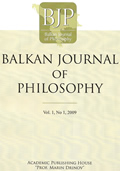An acquaintance constraint and a cognitive significance constraint on singular thought
An acquaintance constraint and a cognitive significance constraint on singular thought
Author(s): Mirela FušSubject(s): Philosophy
Published by: Институт по философия и социология при БАН
Keywords: singular thought; acquaintance constraint; cognitive significance constraint; indexical-iconic representation; indexical-discursive representation;
Summary/Abstract: Among Singularists, it has been widely accepted that one can have singular thought by acquaintance, and that acquaintance encompasses the perceptual acquiring, memorizing and communicating of singular thoughts. I defend the possibility of having a singular thought via extending acquaintance to intermediaries other than just through written and spoken words. On my account, singular thought includes two types of representations, namely indexical-iconic representation and indexical-discursive representation. Also, it is determined by two constraints: (i) the acquaintance constraint: singular thought includes a causalhistorical relation to the object; and (ii) the cognitive significance constraint: we have a cognitive capacity to deliberately encode an indexical-iconic representation into an indexical-discursive representation, which enables us to have a singular thought.
Journal: Balkan Journal of Philosophy
- Issue Year: V/2013
- Issue No: 2
- Page Range: 163-174
- Page Count: 12
- Language: English

